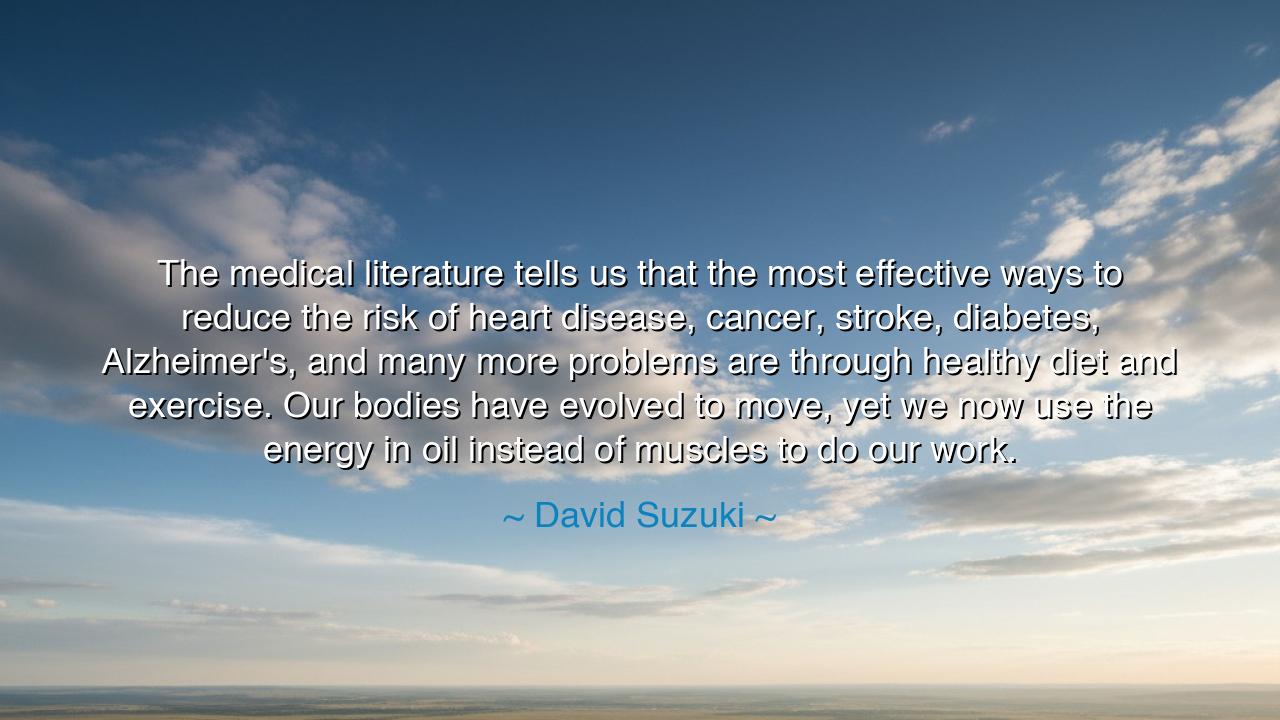
The medical literature tells us that the most effective ways to
The medical literature tells us that the most effective ways to reduce the risk of heart disease, cancer, stroke, diabetes, Alzheimer's, and many more problems are through healthy diet and exercise. Our bodies have evolved to move, yet we now use the energy in oil instead of muscles to do our work.






In the powerful and prophetic words of David Suzuki, scientist, teacher, and guardian of the Earth, we hear a truth that is both ancient and urgent: “The medical literature tells us that the most effective ways to reduce the risk of heart disease, cancer, stroke, diabetes, Alzheimer’s, and many more problems are through healthy diet and exercise. Our bodies have evolved to move, yet we now use the energy in oil instead of muscles to do our work.” Though wrapped in the language of modern science, these words carry the heartbeat of timeless wisdom — a reminder that the path to health, strength, and harmony has always been written in the laws of nature.
To understand his message, one must first see beyond the simplicity of his statement. Suzuki speaks not only of diet and exercise, but of balance — the sacred equilibrium between body, earth, and spirit. For thousands of years, humankind thrived in rhythm with the world: we walked the forests, tilled the soil, drew strength from the sun, and labored with our hands. But now, in an age of engines and machines, we have traded the energy of the flesh for the fuel of oil. Our muscles grow weak while our engines grow strong; our tables overflow with food, yet our bodies starve for vitality. Thus, the diseases that plague the modern age — the slow ailments of excess and inaction — are not punishments from fate, but the inevitable result of forgetting who we are.
In saying that our bodies have evolved to move, Suzuki calls us back to our origin. From the first humans who roamed the savannas to the farmers who built the first villages, movement was life. Our ancestors hunted, gathered, planted, and built. Through effort, they shaped not only their world but themselves — bones grew stronger, hearts beat with vigor, and minds stayed sharp. The pulse of motion was the rhythm of survival. Now, we sit — in cars, in offices, before screens — and the body, born to work and wander, begins to decay. Muscles shrink, hearts strain, minds dull. The body’s wisdom, ignored, turns upon itself.
Consider the story of the blue zones, regions scattered across the Earth — from Okinawa to Sardinia — where people live longer and healthier than anywhere else. Scientists sought their secret and found no magic pill, no advanced technology, no hidden cure. Instead, they found the simple truths Suzuki speaks of: fresh food from the earth, daily movement, strong community, and harmony with nature. These people do not need gyms or diets; their lives themselves are their exercise, their joy their medicine. They embody the law that health is not a pursuit, but a way of being.
Suzuki’s mention of oil carries more than physical meaning — it is a symbol of how humanity has separated itself from the natural order. Once, our energy came from the sun, flowing through plants, through animals, through us — the eternal cycle of life. But now, we burn the dead remains of ancient forests to power machines that replace our own bodies. In doing so, we have gained comfort, but lost connection. We have conquered distance, but surrendered vitality. The body was made to labor and to love that labor — yet in our pursuit of ease, we have imprisoned it in stillness.
The wisdom here is not to reject progress, but to remember the ancient covenant between humanity and nature: that health comes from alignment, not defiance. When we eat food that springs from the soil, when we move as our ancestors moved, when we breathe the air untainted by haste and greed — then we honor the design of our bodies and the rhythm of the world. Suzuki, though a man of science, speaks with the soul of a sage when he reminds us that our evolution is not merely biological, but spiritual. The more we separate from nature, the more we separate from ourselves.
The lesson, then, is clear: return to movement, return to simplicity, return to the Earth. Let every day contain the sacred act of walking, the nourishment of real food, and the humility of gratitude. Do not seek life in machines, for they can only mimic what already lives within you. The true energy lies in your heart, in your breath, in your will to move. Let your muscles remember their purpose; let your spirit remember its strength.
So, O child of the modern world, heed the wisdom of David Suzuki: “Our bodies have evolved to move.” Do not betray that sacred design. Rise from your chair and walk beneath the open sky. Choose food that comes from the hands of the earth, not the hands of factories. Honor your body as the vessel through which life itself flows. For in the harmony of movement and nature, you will rediscover what the ancients always knew — that health is not merely the absence of disease, but the joyful presence of life.






AAdministratorAdministrator
Welcome, honored guests. Please leave a comment, we will respond soon